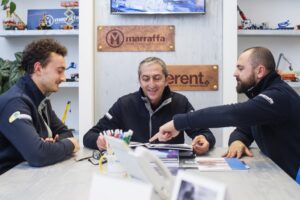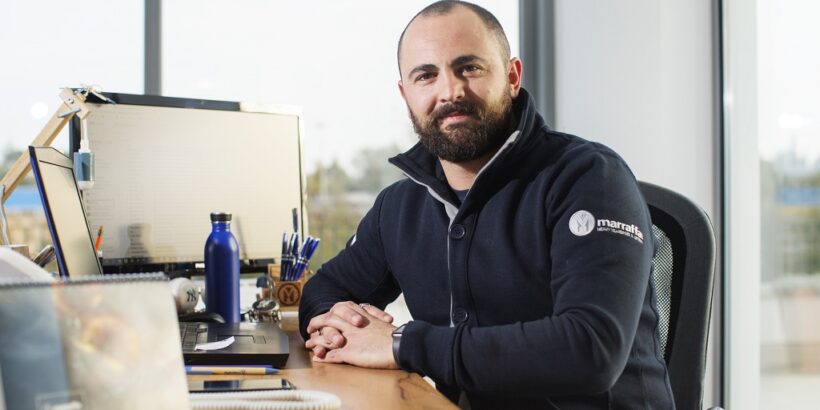Giovanni Marraffa is the company’s Project Manager, who together with his brother Pasquale, runs the Marraffa company
Marraffa carries out transports which are exceptional in terms of weight and size using extendable and expandable vehicles, together with a safety car service carried out by authorised personnel and vehicles. The continuous development and renewal of the fleet allows us to manage any kind of transport, handling and lifting, together with the relevant auxiliary operations. Giovanni Marraffa is the company’s Project Manager.
Tell me about your company’s activities in Italy and on an international scale in this sector.
For more than 40 years, we have been providing exceptional transport, national transport and crane services for all types of activities, both in Italy and abroad, relying on our highly specialised and professional staff. Several years ago, my father Michele Marraffa (who founded the company and has always been our sole director), built this company on the basis of his own experience of working in the handling sector in the broadest sense of the term: in addition to machinery, innovations in the field and the concept of studying new projects, his real focus was on people, giving them all the training they needed to face new challenges on a daily basis. A challenge that, together with my brother Pasquale, we have seized with both hands to give continuity to our company mission.
Are there further opportunities for growth? In which sector and geographical area?
One fast-growing sector is that of energy, and there is a lot to be done there over the coming years. The electricity sector in Italy and Europe is going through a phase of profound transformation, with an energy transition characterized by a steady increase in renewable production sources and the simultaneous gradual phasing out of traditional power plants. In this context of great change at a global level, electricity grids and transmission system operators are playing an increasingly central role, with objectives related to environmental sustainability, competitiveness and safety.
What are your priorities for the coming years?
 The road has already been mapped out for us in recent years. We will continue to work on staff training, we will continue to focus on safety, and we will continue to focus on the best operators and technicians. As the management at the head of the MarraffaWerent Group, we are absolutely convinced that, together with the vehicles, machines and technology, human resources are the real strength of our company.
The road has already been mapped out for us in recent years. We will continue to work on staff training, we will continue to focus on safety, and we will continue to focus on the best operators and technicians. As the management at the head of the MarraffaWerent Group, we are absolutely convinced that, together with the vehicles, machines and technology, human resources are the real strength of our company.
What have been the biggest challenges for your company in recent years?
In Italy there are several leading manufacturers of wagons for railway maintenance and diagnostics and, for this reason, we have recently seen an increase in demand for exceptional transport of these particular type of railway wagons, which are shipped all over Europe. Another activity of which we are particularly proud is the one performed in Foggia, at the Istituto Poligrafico e Zecca dello Stato for the implementation of a Green Data Center solution. More recently, Marraffa was involved in the removal of the Monolith of radioactive waste that had been buried for half a century in the Irreversible Pit of the Enea research centre in Rotondella, in the province of Matera in Basilicata. Marraffa took care of the extraction operations from the old pit using special large crane trucks and the subsequent phases needed to transport it to its new housing,, using the technology offered by the latest generation of SPMT self-propelled vehicles. Marraffa was responsible for all of the operational phases of this activity, taking care of every single detail of the entire project design phase, which was particularly demanding. In recent years, we have also been involved in one of the largest abnormal transports ever carried out on the Italian roads, involving around 25 people including technicians, staff and operating personnel; a project whose realisation was made possible thanks to the collaboration of all of the road authorities and the aid of some universities (around nine months of planning for a single exceptional handling operation). It involved the transport of a 420-ton carbamate condenser, which left Terno d’Isola, where the manufacturer FBM Hudson Italiana is based, and was transported to the river port of Mantua to be loaded onto a barge and subsequently moved to the port of Marghera for final shipment to Asia.
What problems are there in terms of investment?
In Italy there is the problem of excessive bureaucracy, a factor which drastically slows down investment and public works. Italian companies need more confidence and, above all, more certainty in terms of government and legislation. As far as our sectors are concerned, the revision of the Italian infrastructure network is a priority, especially for bridges and overpasses, so that the load-bearing capacity of the structures can be guaranteed. For us, every exceptional transport operation requires a long study phase, made up of on-site inspections and analyses to find the best solution, but when it comes to revising infrastructure, Italy needs to keep up with the times. Alongside this, it is also necessary to work on the implementation of new technologies for sustainable fuels, starting with biofuel and biogas.

